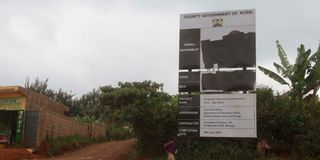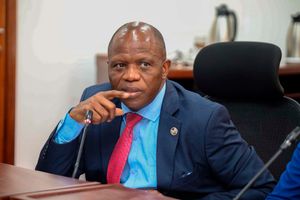
A defaced road murraming project signboard at Kiamwathi area in Nyeri County in 2020.
Politicians and public officials who label public projects and vehicles with their names and portraits are breaking the law, the Senate has said in a new report that slams the personalisation of public resources.
The Senate Committee on Devolution and Intergovernmental Relations, chaired by Wajir Senator Sheikh Mohamed, found that the practice, particularly by governors and Members of County Assemblies (MCAs), violates constitutional and statutory provisions guiding public officers.
The committee noted a surge in the use of names, portraits, and political slogans on government-funded infrastructure and vehicles, a trend that has drawn criticism from civil society and legal experts.
According to the committee, this trend creates a false impression that the projects are personal initiatives, while in reality they are financed by taxpayers.
“Branding public property with the names and images of individuals is not only unethical, but unconstitutional. It amounts to misuse of public funds and contravenes various sections of the law,” the report states.
The report cites violations of Chapter Six of the Constitution of Kenya, 2010, which outlines the principles of leadership and integrity, as well as the Public Officer Ethics Act (Cap 183), the Leadership and Integrity Act (Cap 185C), and the Public Service (Values and Principles) Act, 2015.
It further notes that the practice contradicts provisions of the Public Finance Management Act, 2012 (Sections 79 and 162), which emphasise transparency, accountability, and prudent use of public resources.
The Senate now wants oversight bodies, including the Ethics and Anti-Corruption Commission (EACC), the Office of the Auditor-General, and the Controller of Budget, to enforce strict compliance within 30 days.
The report recommends that these agencies issue advisories, conduct audits, monitor public spending on branding activities, and take disciplinary actions against public officials who flout the law.
“Public officers, including Governors, MCAs, and others, must stop using public funds for self-promotion. They are servants of the people, not demigods,” said Senator Mohamed. He urged institutions to restore the integrity of public service by ensuring all branding is strictly institutional and not individual.
To curb the practice, the committee recommends that all government vehicles should display their official registration numbers clearly and permanently on the vehicle body.
Personal billboards
This directive aligns with the Traffic Act (Registration Plates), which specifies the format and positioning of registration plates.
The Senate report stems from a petition submitted by Laban Omusundi, a resident of Nakuru County and Executive Director of the Grassroots Civilian Oversight Initiative.
Mr Omusundi raised concerns that governors and MCAs across all 47 counties were branding development projects and vehicles with their names, faces, and campaign slogans - turning public investments into personal billboards.
“This conduct portrays the projects as if they were funded by the politicians, rather than by taxpayers. It is misleading and distorts the spirit of public accountability,” the petitioner said.
He further argued that this behaviour is comparable to the prohibited practice of placing individual portraits on Kenyan currency - a point supported by Article 231(4) of the Constitution.
“Historically, monarchs used portraits to assert divinity. But Kenya is a republic. Leaders are servants, not small gods,” the petition reads.
The petitioner urged the Senate to consider amending the County Governments Act, 2012, to permanently bar governors and MCAs from personal branding of public-funded assets. Instead, he proposed that projects be branded simply: “Courtesy of the Taxpayers of Kenya.”
He also raised the issue of unbranded county government vehicles being used for unofficial business. The petition called on the Senate to pass regulations requiring such vehicles to carry national flag colours and identification to deter misuse and enhance public oversight.
“If public vehicles are misused, citizens should have the right to peacefully take corrective action or report the misuse,” Mr Omusundi said.
Despite attempts to engage the Council of Governors and the Attorney General’s Office on the matter, the petitioner said no action had been taken, prompting his formal appeal to the Senate.
The committee backed many of the petitioner’s proposals and reiterated the need for strong deterrent measures.
“We are sending a clear message: public service is about humility and accountability. Leaders must not abuse their positions for personal glorification,” said Senator Mohamed.
The EACC has been directed to file a report to the Senate within 30 days of the report’s tabling, detailing interventions taken to restrain branding of public assets. The committee also wants the Auditor-General and Controller of Budget to conduct special audits to trace the use of public funds on unauthorised branding.
“We urge counties to lead by example. Let our public infrastructure reflect the collective effort of citizens, not the ambitions of individual leaders,” the report concludes.








